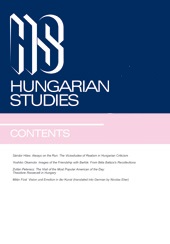Exile in the hotel plaza: The twilight years of Ferenc Molnár (1940–1952)
Exile in the hotel plaza: The twilight years of Ferenc Molnár (1940–1952)
Author(s): Ágnes SzéchenyiSubject(s): Theatre, Dance, Performing Arts, Cultural history, Social history, Recent History (1900 till today)
Published by: Akadémiai Kiadó
Keywords: Jewish-Hungarian culture; international success; Max Reinhardt; Broadway; emigration; exile; Paul Street Boys; Carousel; adaptation of genre conventions; immigrant spirit;
Summary/Abstract: The internationally recognized Hungarian playwright Ferenc Molnár settled over to the United States in 1940, well beyond the top of his career. He was an essentially Hungarian, more precisely metropolitan author, with accents from Pest, famour for his ingeniously Hungarian sense of humour. Yet he became the most frequently translated Hungarian playwright of his era, with immense and immediate international success. Practically, Molnár did not live in Hungary from the beginning of the Horthy era (1920–1944), but the Jewish-Hungarian author decided to leave Europe well after Hitler’s takeover only. His name was known even in the United States: his first really successful play, The Devil was staged in New York in 1908, a year after being first performed in Budapest. Several of his plays had a phenomenal success story in the 1920s, his The Play is the Thing had its world premiere in New York in 1926. Carousel, the “Best Musical of the 20th Century”, by Rodgers and Hammerstein, was based on Molnár’s 1909 play Liliom. This article aims at reconstructing Molnár’s overseas network and recreating the spirit and growing loneliness of immigrants. It also tries to answer the question of how the work of an author so deeply embedded in Hungarian language and culture could be translated and adapted to foreign languages.
- Issue Year: 23/2009
- Issue No: 1
- Page Range: 77-105
- Page Count: 29
- Language: English
- Content File-PDF

